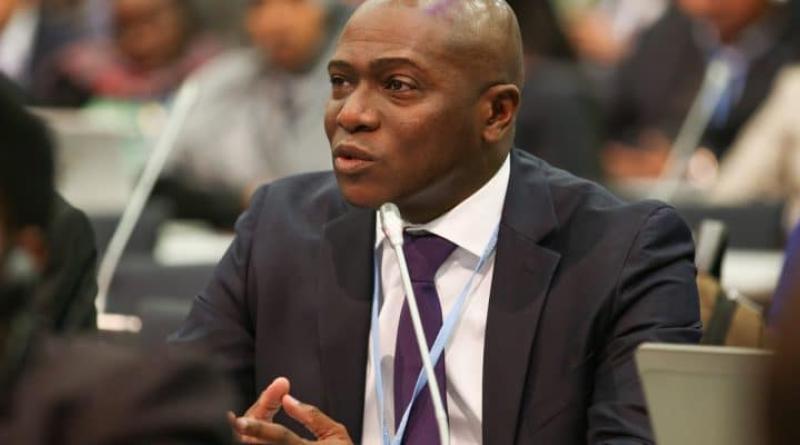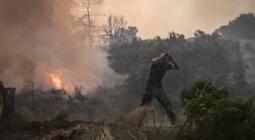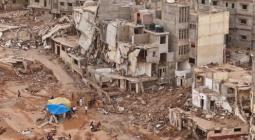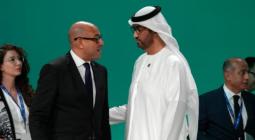COP28: “Africa’s priority remains adaptation” (Tosi Mpanu Mpanu)

COP28 opens this Thursday 30 November in Dubai, United Arab Emirates (UAE). On the sidelines of this major event, Tosi Mpanu Mpanu, the Climate Ambassador for the Democratic Republic of Congo (DRC), gives a long interview to AFRIK21. For this senior negotiator, the priority for the African continent remains adaptation. On the question of financing, he believes that the industrialised countries must show leadership in climate action.
Jean Marie Takouleu: COP28 opens on 30 November 2023 in Dubai, United Arab Emirates (UAE). The negotiations begin just a few days after a compromise was reached on the future Loss and Damage Fund, which will ultimately be housed at the World Bank for four years. This was the wish of the United States of America and the European Union (EU). The countries of the South wanted an autonomous funding mechanism, with its own management system. How do you explain this position on the part of the South?
Tosi Mpanu Mpanu: The South and the developed countries, which were at opposite ends of the spectrum at the outset, managed to agree on a mechanism for financing loss and damage. We went from a concept that was a little vague at the outset to something a little more concrete, even if the fund established is not totally autonomous.
In fact, the developed countries wanted to house the fund in an existing institution (the World Bank, editor’s note) which already has an operating structure. The fund was created at COP27 in Egypt, with a transitional committee that was to work for a year on a governance instrument. In the final hours of negotiations by the members of the transitional committee, a compromise was reached to house the Loss and Damage Fund at the World Bank for four years. For us, this is a compromise, not a compromise. A solution had to be found before the start of COP28.
So the big climate meeting is on. At the African Climate Summit (ACS) a few months ago in Nairobi, the African countries agreed to speak with one voice in Dubai. Could this step forward help you in the negotiations at COP28?
Since I started negotiating at COP13 in Bali, Indonesia, in 2007, African countries have always spoken with one voice. At the time, there were 53 African countries, as Sudan was still a single country (before the independence of South Sudan in 2011, editor’s note). It was important to go to these negotiations (with 200 States parties) with a common position. Today, Africa has 55 countries speaking with a single voice with a view to influencing the negotiations. It is therefore a voice that can be used as a lever to advance positions.
As negotiators, we have always entered these discussions with a common position. This is simply because we know that if we go our separate ways, we have little chance of advancing the position of the African Union (AU). It is a common position that is not prejudicial to any of the African countries, meaning that the position adopted for the continent must apply both to Egypt, even though it is part of the Arab Group, and to Cape Verde, despite its membership of the Small Island Developing States (SIDS) group, and so on.
For us, this is a political commitment, but it does not necessarily reflect the level of nuance and technical detail applied to the negotiations themselves.
What does this mean in concrete terms?
For example, we had to make a lot of amendments to the position initially adopted by the African Union Commission (AUC). The declaration was not bad, on the contrary. The themes, notably food security, energy, financing and socio-economic security, were very important. But sometimes the language used was not that of the actual negotiations. Unfortunately, in our negotiations, the phrasing has to remain surgical.
When we start negotiations at the COP in Dubai, we will be working on texts that have a particular jargon, with a certain layout. We will use the Nairobi Declaration as a compass, without sticking to it word for word. Especially as it contains certain provisions, notably on Special Drawing Rights (SDRs), which are managed by the Bretton Woods institutions (International Monetary Fund and World Bank, editor’s note).
So what are the African continent’s priorities at this Emirati COP?
Africa is the continent that emits the least greenhouse gases (GHGs). Historically, we have emitted 3% of global emissions. Today, we are responsible for 4% of global emissions. Unfortunately, Africa is the continent most vulnerable to the harmful effects of climate change. So the priority for the African continent remains adaptation. Because climate change brings with it additional costs in terms of development, which slows down the prospects for reducing poverty and the conditions for growth that governments are trying to implement.
Africa is suffering droughts, floods and epidemics because of climate change that we did not create. Some countries have the potential to mitigate, but to do so requires funding, capacity building and technology transfer.
We are now capable of implementing part of our Nationally Determined Contributions (NDCs) with our own resources. But the other part is conditional on the provision of means of implementation. Otherwise, we will unfortunately have to concentrate on our own priorities, notably economic development and poverty reduction. Otherwise, for Africa’s small island states, the issue of loss and damage is also important.
In view of the lack of funding, despite the pledge of 100 billion dollars per year made at COP15 in Denmark, shouldn’t African states finally devote part of their national budgets to adapting to climate change?
Yes, because of the vagaries of the climate, before international aid can arrive, it’s our finance ministers who have to react, with a budget imbalance that they hadn’t necessarily foreseen. We need to be proactive in taking ownership of this climate change issue, particularly at the level of our legislators, civil society, the private sector, centres of excellence, universities, and so on.
In addition, international climate governance, based on the United Nations Framework Convention on Climate Change (UNFCCC) adopted in 1992, the Kyoto Protocol in force since 2005 and more recently the Paris Agreement, takes account of the historical responsibility of industrialised countries and calls on them to show leadership in climate action and provide financial support. This international funding must support the national efforts of African countries.
At COP15 in Copenhagen (Denmark) in 2009, we set ourselves the target of mobilising 100 billion dollars each year for developing countries. The fact that this target has still not been met 14 years on raises questions. Yet this 100 billion dollars is no longer sufficient to meet the growing needs of African countries. To implement their NDCs, the continent’s governments will need 2,800 billion dollars between now and 2030.
This is why there is now a fairly sensitive discussion on the New Collective Quantified Target on Climate Change Financing (NCQG), which aims to adopt a new figure by 2025. This should not be a political objective, but one that matches the needs of African countries.
Faced with this lack of funding, African leaders are looking for alternatives, notably carbon credits. But the carbon tax on petroleum products provided for in the Nairobi Declaration is being strongly questioned by some non-governmental organisations (NGOs), which believe that it will be a lifeline for big polluters. What is your opinion on this issue?
You have to keep your wits about you. I really like NGOs because they do a lot of research and produce very useful reports. But we have to look at things objectively. We can move towards an ecological and energy transition to achieve carbon neutrality by 2050 and limit the rise in temperature to 1.5° or 2°C. Unfortunately, oil-producing countries are continuing to increase production, not because they want to pollute the planet, but to meet demand.
So if we really want to save the planet, let’s change our consumption patterns, and that will create a drop in demand for petroleum products, and producers will not want to work at a loss. We need to create an incentive for producers to put their hands in their pockets. However, tax pressure should not be punitive, but rather an incentive.
There will be a lot of talk about the energy transition at COP28.
In fact, the African heads of state and government want to increase renewable energy production capacity from 56 GW in 2022 to at least 300 GW by 2030. Yet the continent only receives 3% of the world’s investment in renewable energies. Is this a realistic target?
It’s not a question of realism, but of necessity, because 600 million Africans still live without electricity. At the same time, at least 900 million people cook with charcoal, which exposes them to respiratory diseases. Better access to energy could create productive resources, in particular irrigation, with better agricultural yields. It would also provide better access to education for our young girls, who would be able to work in the fields during the day and study in the evening.
All this is possible today, thanks in particular to the lower cost of certain technologies. Before, there was a large source of electricity production, associated with transmission over long distances, with losses, and a huge cost for installing transmission infrastructure. Today, there are decentralised, off-grid systems that bring electricity directly to where the demand is. These are disparate systems that could, over time, interconnect.
It is absolutely essential to support this desire by liberalising the electricity sector to allow private players to invest in these new solutions. Facilities or guarantee funds will also have to be set up to facilitate entrepreneurship so that the renewable energy sector can really develop. The target of 300 GW by 2030 is not just a matter for governments and big business. It requires a real decentralisation to produce at least 1 additional MW every day.
In its updated Nationally Determined Contribution (NDC), the DRC is committed to achieving an emissions reduction target of 21% by 2030, of which 19% is conditional on support. At the same time, your country wants to start producing fossil fuels (oil and gas). Isn’t there a contradiction here?
A call for tenders has been launched for 27 oil blocks and three gas blocks. But actual production has not yet begun. The DRC is an extremely poor country, with 80% of the population living on less than 2 dollars a day. The country cannot afford to deprive itself of every possible means of generating revenue. Until now, we have concentrated on the mining sector, and the DRC has the sovereign right to explore all its oil potential.
We need to stop this hypocrisy, because if the DRC were to produce its own oil, that energy would be consumed abroad. The countries that point the finger at us and say that we’re bad at climate change need to reduce their demand for oil. If countries like the United States of America, Norway, France, Russia, Saudi Arabia, Qatar and the United Arab Emirates (UAE) continue to increase their production, why not the DRC?
Paradoxically, the DRC, which has low incomes, is unable to manage certain aspects of its environmental policy properly. We are in the process of losing the fight for forest conservation, because we don’t have enough resources. There’s a kind of environmental colonialism that says that, to preserve our forest, we have to reach out to international donors. And yet, by producing oil, we can have more resources and allocate part of them to preserving the environment.
What’s more, with modern means, we can reduce the environmental impact of oil extraction, in particular by capturing the gas that is often flared. Objectively speaking, all the strategic minerals used to make batteries for electric cars and other storage systems for solar power stations come from the DRC. So we are making a surplus contribution to decarbonising the global economy.
What about deposits located in protected areas?
There is also a way of reaching a protected area without being able to penetrate it. What’s more, the DRC is prepared not to exploit this resource, if and only if we get fair compensation.
Interview by Jean Marie Takouleu






